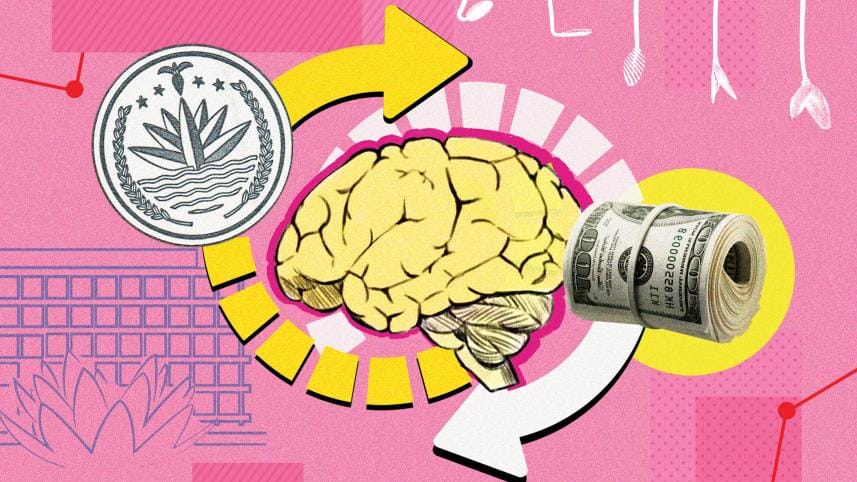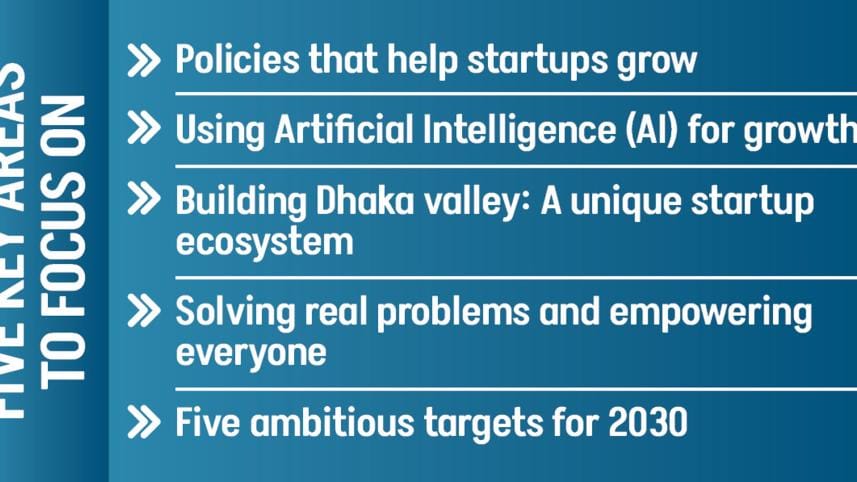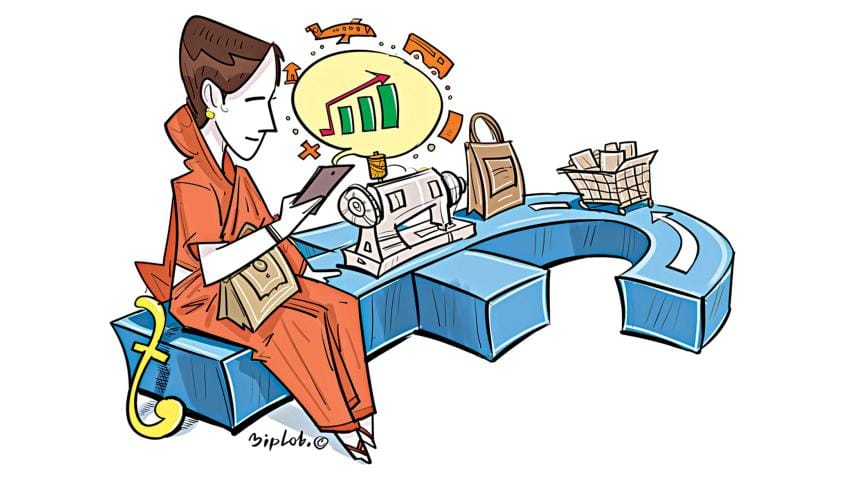Bangladesh in 2030: Leapfrogging into the startup future

Imagine this: Bangladesh in 2030 is not just a country, but a shining example of what people can achieve together. Innovation, hard work, and hope have transformed our nation. The streets of Dhaka are cleaner and smarter, with systems run by artificial intelligence. Small businesses grow rapidly, using e-commerce to reach the world. Clean energy lights up homes, and self-driving vehicles transport goods from villages to cities.
Let us discover how Bangladesh can become a global leader through startups, technology, and inclusivity. Below is a roadmap to building a brighter future for all.
It's 2025, and Bangladesh is at an exciting turning point. The world is changing quickly with new technologies, ideas, and brave entrepreneurs. In 2024, when Donald Trump was re-elected, his focus on advancing artificial intelligence and empowering tech startups inspired many nations to rethink their strategies. Trump's policies promoted innovation in leading tech companies, showcasing how technology could shape a nation's future. While debates unfolded in the West, countries like China, India, and Indonesia continued building stronger startup ecosystems. Today, China leads in artificial intelligence, India has created over $100 dollar companies, and Indonesia is the startup leader of Southeast Asia. Bangladesh now faces the same big question: Will we wait and watch, or will we build our future through startups?
We must act wisely and move fast. Like in a game of chess, we need the right moves to win. Just like Doctor Strange, who had to choose the one victorious path out of 14 million probabilities, Bangladesh must identify and act on the best strategies for success. Here's how Bangladesh can lead the way with startups by 2030.

1) POLICIES THAT HELP STARTUPS GROW
We need innovative and straightforward policies that directly support innovation to achieve our ambitious targets. For example, India made it easy for startups to register, offered tax benefits, and created funds to help new businesses. Bangladesh needs to:
Be the facilitator, not the regulator: Focus on enabling growth through rewards and incentives for solving significant national problems, as the government did for the RMG sector, India did for UPI, and America did for EVs. Reduce unnecessary regulatory hurdles.
Make registration easy: Develop a one-stop business portal for startups and SMEs to quickly register and comply with regulations. Allow startups to register in foreign countries like Singapore, enabling them to access global markets and investment opportunities. Encourage local and non-resident Bangladeshi (NRB) angels and investors to invest in those startups globally, fostering a truly international ecosystem.
Tax benefits for startups and SMEs: Offer affordable, friendly tax policies to encourage more businesses to enter the tax net. Plan for a decade-long strategy rather than yearly collection targets. Introduce incentives to encourage cashless transactions, promote the use of modern apps, and connect these private systems to a national data lake for greater efficiency and transparency. With supportive policies, bypassing the system will become unnecessary.
Government-backed funds: Launch a fund to attract billions in foreign investment and support high-potential startups. Provide tax benefits to investors who fund startups and SMEs, and create easy exit options to encourage more participation from local and foreign investors.
With these policies, Bangladesh can become one of the top 30 countries in the Ease of Doing Business ranking.

2) USING ARTIFICIAL INTELLIGENCE (AI) FOR GROWTH
AI is essential for driving innovation and meeting our 2030 goals. It helps companies grow faster and deliver better results. For example, AI helps Alibaba understand customers, powers fintech solutions in India, and streamlines logistics in Indonesia. Bangladesh must:
Adopt AI across sectors: Enable startups and SMEs to leverage AI for customer insights, operational efficiency, and global competitiveness. Use AI to empower people—like wearing Ironman's suit with a virtual assistant like JARVIS—providing tools to solve problems and innovate.
AI in fintech: Use AI to provide small business or personal loans and promote a cashless economy with digital payment systems. Build a strong credit bureau system that integrates AI to establish reliable social scoring for individuals and businesses, fostering trust and financial inclusion.
AI for logistics: Streamline supply chains and improve cross-border trade for SMEs using AI-powered solutions.
Government subsidies and incentives for AI adoption: Provide subsidies to encourage the use of AI across industries, especially in areas that boost GDP growth or solve national problems. Reward innovative solutions that address critical issues such as improving GDP, increasing remittance, or saving public funds.
Convert population into global assets: Encourage startups to transform Bangladesh's 200 million people into a globally skilled workforce, earning more for the nation.
AI in public systems: Deploy AI to repair and enhance education, healthcare, and traffic management systems, building a strong and values-driven nation.
Adopting AI with focused efforts will make Bangladesh a global leader in technology and innovation. We don't need to reinvent concepts like E=MC²—let's build on proven strategies and adapt them to solve our unique challenges effectively.

3) BUILDING DHAKA VALLEY: A UNIQUE STARTUP ECOSYSTEM
To achieve our ambitious targets, we need an ecosystem tailored to Bangladesh. Lessons from Indonesia's Gojek and India's Paytm offer valuable insights. Key actions include:
Corporate partnerships: Encourage companies like Walton and BSRM to invest in and mentor startups, fostering innovation.
Platform-based models: Build platforms addressing local needs, such as rural connectivity, logistics, global technology exports, and SME enablement.
Export-driven growth: Support startups and SMEs in creating products for South Asia, Africa, and beyond.
Dhaka Valley can drive regional and global innovation, setting new benchmarks for the world.
4) SOLVING REAL PROBLEMS AND EMPOWERING EVERYONE
Startups and SMEs must focus on addressing challenges unique to Bangladesh while uplifting all sectors of society to achieve our 2030 vision. For example:
Improving supply chains: Develop systems to connect rural producers with urban markets and global buyers, driving efficiency and growth.
Affordable e-commerce platforms: Create cost-effective solutions to help startups and SMEs scale operations, supporting cross-border sales and global competitiveness. Integrate offline and online channels into omnichannel businesses to create more sales opportunities for SMEs.
Train a skilled workforce: Teach coding, e-commerce, and AI to prepare individuals for global remote jobs, turning Bangladesh's population into a global asset.
Support women entrepreneurs: Provide funding and mentorship for women-led ventures, fostering equality and inclusion in economic growth.
Boost rural and global opportunities: Build hubs to connect rural producers to markets and expand remittance through skilled workforce exports, targeting an additional $30 billion annually.
By addressing these critical issues and empowering every segment of society with tailor-made solutions, Bangladesh can create a stronger, more resilient economy and enhance its global footprint. We don't need to reinvent the wheel—let's adapt proven strategies to our unique challenges effectively.
5) FIVE AMBITIOUS TARGETS FOR 2030
To achieve our vision for Bangladesh, we need to focus on these five ambitious targets:
SME contribution to GDP: Ensure that SMEs contribute 30 percent of GDP by 2030 and aim for 50 percent by 2050, making them a cornerstone of the economy.
Attracting investment: Secure billions of dollars in foreign investment into startups, creating jobs and boosting innovation.
Cashless economy: Transition to a 70 percent cashless Bangladesh, leaving only 30 percent of transactions in cash, enhancing transparency and efficiency.
Global opportunities for SMEs and people: Enable more earning sources by supporting cross-border sales for qualified SMEs, expanding Bangladesh's technology footprint globally, increasing the supply of skilled professionals for remote and global jobs, and adding an additional $30 billion in annual remittance through enhanced opportunities.
Ease of Doing Business ranking: Create a single business portal with affordable, friendly tax policies that bring more individuals and businesses under the tax net. Aim to elevate Bangladesh to one of the top 30 countries in the Ease of Doing Business ranking.
CONCLUSION
Bangladesh in 2030 is not just a dream—it can be real if we act today. Will we wait and grow slowly, or will we leap ahead with startups and innovation? By learning from the best, solving real problems, and helping all people, we can create a strong and modern economy.



 For all latest news, follow The Daily Star's Google News channel.
For all latest news, follow The Daily Star's Google News channel.
Comments